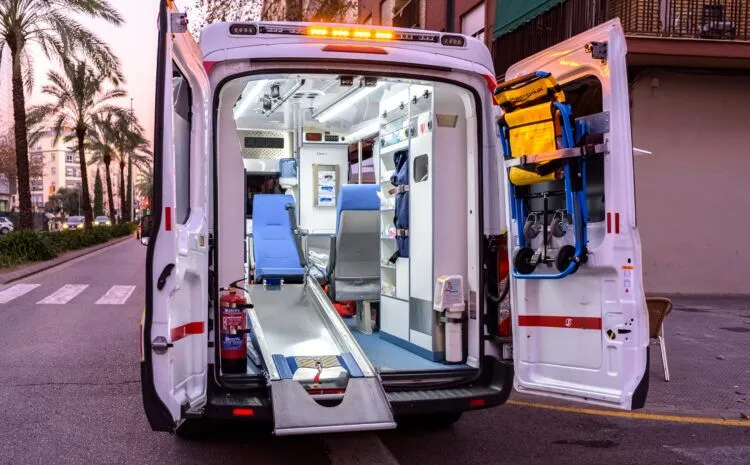
No Surprise Ambulance Bills

As of this writing, Indiana healthcare providers generally do not cover approximately 50%—75% of ambulance charges. The statewide Emergency Medical Services Act (EMS Act) protects persons covered under a private healthcare insurance plan from excessive surprise ambulance bills.
The No Surprises Federal Law Does Not Cover Emergency Ground Transportation
Although the federal government enacted The No Surprises Act into law in 2020, the statute primarily covered air ambulance bills, which can run into the tens of thousands of dollars; it did not mention excessive charges billed by ground transportation ambulance services.
Parties Exempted from the EMS Act
Indiana state employees participating in the state’s healthcare plan are exempt from the protections of the Act due to state budgetary concerns. This could change when the Assembly undertakes a new budget in 2025.
Other non-participating health plans include Medicare, Medicaid, and ERISA (Employer-sponsored group plans.)
Why Did Indiana’s General Assembly Pass the Emergency Medical Services Act?
Governor Eric Holcomb signed the Emergency Medical Services Act (EMS Act) into law in 2024 with several objectives in mind.
- To force healthcare insurance providers to cover ambulance services under their health plans, and to pay a fair portion of ambulance bills using one of the formulas listed below, but with the exceptions of copayments, coinsurance, deductibles, with other cost sharing amounts payable by the patient;
- To assure Indiana health plan members (persons with healthcare insurance) that their healthcare plans *will cover emergency ambulance services, less patient deductibles, copays, and any additional cost share obligations—excessive, surprise ambulance bills will no longer threaten a family’s financial well-being; and
- To reduce the state’s drain of emergency medical technicians (EMTs), paramedics, emergency medical services, and ambulance companies—hundreds of which left the state in the last several years, due to an acute lag or shortage in reimbursement.
*See ‘Parties Exempted from the EMS Act.’
To gain a greater understanding of the legislation, read House Bill 1385.
Opposition From Special Interest Groups
House Bill 1385 was not without opposition. On behalf of small and medium business owners, members of several special interest groups expressed real concerns that higher health plan costs would negatively impact business owners who in turn were likely to pass the all too familiar “higher costs/reduced benefits” model down to their employees. In addition, there was angst that an increase in costs for products and services would have to follow.
While the bill was under discussion, a suggestion was floated that ambulance services should be treated as ‘essential services,’ funded by local taxpayers, just like fire and police. A number of states successfully use the taxpayer-funded model, but in the end, HB 1385, now known as the EMS Act, prevailed.
Bipartisan Support Toward a Permanent Solution
It wasn’t until media picked up the stories of insured families being blindsided with excessive emergency ambulance charges—some totaling more than $10,000— that bipartisan members of the General Assembly determined to take up the matter of insurance companies’ refusal to negotiate discounts for medically necessary ambulance services.
In some cases, the insured’s healthcare plan would elect to pay a nominal fee under the “out-of-network” clause of the policy. One Indiana family was charged nearly $16,000 for the transport of their child to an Indianapolis hospital for emergency surgery. After their health insurance plan made a token “out-of-network contribution” of less than $1,000 for services rendered by the ambulance company, the family remitted their co-pay and deductible with the expectation that their insurance company would negotiate a discount for the balance of $14,000+. Their insurance carrier did not act on their behalf, thus abandoning the family to shoulder the remaining debt.
How Much Reimbursement Can Ambulance Services Expect?
The EMS Act—which does not take effect until January 1, 2025—requires the health plan to pay the non-participating transport provider for ambulance services provided to a covered individual using one of the following formulas:
- at a rate not to exceed the rates set or approved, by contract or ordinance, by the county or municipality in which the ambulance service originated;
- at the rate of 400% of the published rate for ambulance services established under the Medicare law for the same ambulance service provided in the same geographic area; or
- according to the nonparticipating ambulance provider’s billed charges; whichever is less.
The Act further provides that payment by the health plan using one of the above formulas, shall be the maximum extent of repayment with the exception of any other cost sharing amounts, and that an ambulance provider that does not participate in the health plan network, may not bill the individual for additional amounts.
When The Emergency Medical Services Act Takes Effect
House Enrolled Act, HEA 1385, takes effect on January 1, 2025. You should note, however, that some insurance companies have shown a “good faith” willingness to work with ambulance companies throughout the gap period, easing the burden of surprise ambulance bills for plan participants, and to retain the necessary services of EMTs, paramedics and ambulance transport companies in the state of Indiana.
A Personal Injury Lawyer’s Perspective of Ambulance Bills
In my years of practicing personal injury law, ambulance bills, air ambulance bills, and emergency mobile services have always been separate from insurance matters because emergency transportation providers rarely partnered with health insurance providers.
The unintended consequences of insurance companies processing ambulance bills as out-of-network claims has initiated a great exodus of emergency ambulance companies from the state, a significant shortage of emergency transport providers, and an unexpected financial burden on injured persons and their families.

Indianapolis Medical Malpractice FAQs
Our Indianapolis, IN medical malpractice lawyer helps individuals understand their legal rights when medical errors cause harm. Medical malpractice cases involving misdiagnosis or delayed diagnosis can have serious consequences. When a medical professional fails to diagnose a condition accurately or promptly, it can lead to worsening health issues, unnecessary treatments, and even life-threatening situations. Here are some of the most common questions we receive about these cases.
How Do I Know If My Case Qualifies As Medical Malpractice?
To pursue a claim, we need to establish that a doctor or healthcare provider failed to meet the standard of care expected in their field. This means showing that another medical professional, given the same information, would have made the correct diagnosis or recognized the condition sooner. If a misdiagnosis or delayed diagnosis caused harm, you may have a case. Key factors include whether the mistake led to unnecessary treatments, worsening health conditions, or avoidable complications.
What Are Common Conditions That Get Misdiagnosed?
Certain medical conditions are more frequently misdiagnosed or diagnosed too late. Some of the most common include cancer, heart attacks, strokes, infections, and autoimmune diseases. These conditions often have symptoms that overlap with less serious illnesses, leading to incorrect conclusions. If you were misdiagnosed or your diagnosis was delayed, and this led to serious harm, you may have grounds for a medical malpractice claim.
How Long Do I Have To File A Lawsuit?
Every state has a statute of limitations for medical malpractice cases, meaning there is a deadline for taking legal action. In many cases, the time limit starts from the date the misdiagnosis occurred or when the harm was discovered. However, exceptions may apply based on specific circumstances. If you believe a delayed or incorrect diagnosis caused harm, it’s important to act quickly and discuss your options with our award-winning legal team to avoid missing the deadline.
What Kind Of Compensation Can I Receive?
If a medical professional’s mistake caused significant harm, compensation may be available for medical expenses, lost wages, pain and suffering, and other damages. The exact amount depends on factors such as the severity of the injury, the cost of additional treatments, and the long-term impact on your health. According to our Indianapolis medical malpractice lawyer, a successful claim can help cover the financial and emotional burdens caused by a misdiagnosis or delayed diagnosis.
What Should I Do If I Think I Was Misdiagnosed?
If you suspect that a medical error led to harm, seek a second opinion from another healthcare provider as soon as possible. Medical records play a key role in these cases, so gathering documentation of your visits, test results, and treatments is important. Then, speak with our legal team that handles medical malpractice cases to review your situation and determine if you have a case.
Misdiagnosis and delayed diagnosis cases can have lasting effects on a person’s health and financial stability. If you believe a medical professional’s mistake caused you harm, Ward & Ward Personal Injury Lawyers is here to help. Contact our Indianapolis medical malpractice lawyer today for a free consultation to discuss your legal rights and next steps.
Contact The Experienced Indiana Personal Injury Lawyers
If you have been injured in an accident caused by a negligent party, Ward & Ward Personal Injury Lawyers would like to represent you and assist you in recovering your medical bills, and any other economic and non-economic damages you may have suffered as a result.
Call Ward & Ward Personal Injury Lawyers today at (317) 639-9501 – ask for me, Charlie Ward, for a free, no-obligation consultation about your claim.
I look forward to hearing from you.
Charlie Ward
Personal Injury Lawyer


